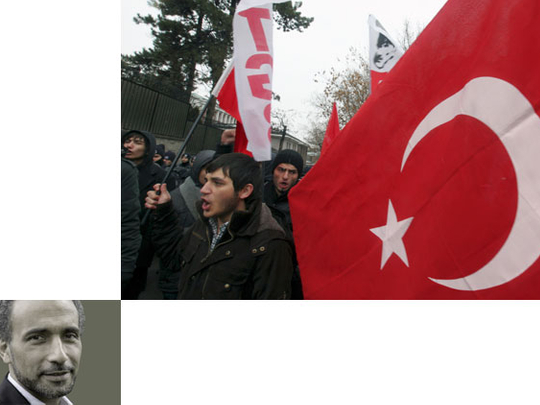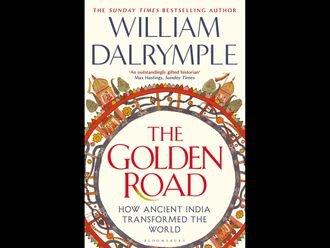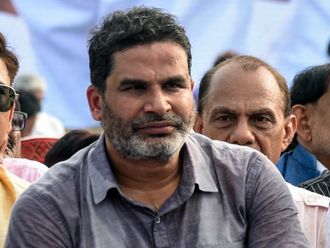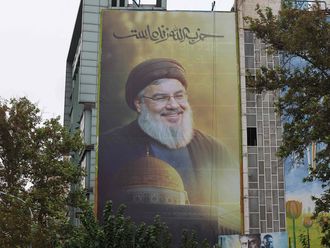
Relations between Turkey and France have suddenly become strained following the decision of the French senate — with its newfound Left majority —to “penalise negation of the Armenian genocide”. In May 2011 this very same senate, then with a Right majority, rejected the same proposed legislation.
A first conclusion: in France the debate is inspired by political considerations directly related to the competition between Left and Right. Concern for genuine debate on historical truth comes far behind the political dividends the proposed law’s sponsors hope to reap.
It must be remembered that the debate over ‘historical truth’ has its roots in the tensions that accompanied adoption of the ‘Gayssot Law’ that incriminates any individual who denies the reality of a crime against humanity, the target being those who argue that the extermination of the Jews in the gas chambers of Nazi Germany during the Second World War never took place.
The law was fiercely debated and touched off polemics between schools of thought. Numerous historians criticised the law, claiming that it would be unhealthy to legislate historical facts, to use the law to set down a single definite reading of history by criminalising certain analyses and perceptions.
It quickly became apparent that, in the name of freedom of inquiry and, above all, in the name of the necessity of clearly distinguishing between orders, it was indeed possible to hold in contempt the ‘Holocaust deniers’, without necessarily supporting the law. An extermination had indeed taken place; but it was not by legally imposing its recognition that enquiring minds, particularly those of the younger generation, will be able to absorb the lessons of history.
Problematic approach
All of which puts us squarely before the identical, and highly problematic, approach to the ‘Armenian question’. The French senate would now penalise those who argue that ‘a genocide’ did not occur. What exactly is the utility of such a law, and what will be its scope? For students of history, for scholars who attempt to establish what happened, the situation is far less clear than would appear at first glance, and opinions more sharply divergent than those concerning the extermination of European Jewry.
My position, which recognises the reality of the genocide, earned me sharp criticism in Turkey at the highest state level. At the same time, I welcome the current government’s intention to set up a scientific research commission that would delve once more into history, and establish the facts. This, in my opinion, is the only possible valid approach. The Turkish government’s stance has evolved considerably; it has demonstrated its readiness for a constructive dialogue.
Many Turks, as well as Armenians, have saluted its initiative, and urged that the issue be faced openly and dealt with by scientific examination. I have arrived at my current position on the Armenian genocide in the light of the knowledge acquired by study of the question: by no means do I rule out revising my judgment if new information or elements unknown to me were to become available. An informed, prudent mind can deal with history in no other way. History can prove anything, asserted Paul Valery; it is equally clear that it can be travestied, inverted and falsified.
The Gayssot Law and the current debate over the criminalisation of Armenian genocide denial are not only unhealthy; they are counterproductive. Instead of encouraging scientific research and discussion, positions are cast in concrete; interpretations acquire the weight of the legislation that protects them, and not of the facts that confirm them.
Playing with polemics
There is every reason for concern. At the same time, the good will of the Turkish authorities is rejected and brushed aside. It is tempting to conclude that this polemic is being used to conceal other objectives. For ultimately, whatever one’s position on the ‘Armenian affair’, history cannot be codified and defined by a law or political fiat.
The French decision to adopt such a law is neither intelligent nor scientific. It represents, in the event, the exploitation of a historical question for unstated political aims (both domestic and international). Can there be a single serious mind, a single competent historian, who could possibly accept that the past be regulated by the law, that research be penalised or criminalised?
Agree with the official Turkish position or not, it must be recognised that the just and proper position must remain the establishment a scientific commission and the opening up of debate, rather than the imposition of one single valid (political) interpretation of history, all of which the new government has undertaken to do.
What is France, whose contradictory political forces stand revealed by the current polemic, attempting to achieve? It is not only astonishing but also extremely dangerous to attempt to define history in the name of shadowy interests on the eve of a tension-ridden electoral period. It would seem that the Armenian question is not to be resolved in Turkey. Is this in fact the ultimate objective?
The Armenian affair is manifestly one of those issues that can be relied upon when necessary to hold Turkey at arm’s length from the European Union.
It is obvious that the issues involved are complex, and have little to do with historical reality. The Turkish government has recently opened up channels of dialogue with Armenian communities. Not only does the French decision fly in the face of any serious scientific approach; it is above all counterproductive, in that it needlessly polarises positions. In fact, it is driven more by negative prejudice against Turkey than by the noble search for and defence of historical truth.
Tariq Ramadan is professor of Contemporary Islamic Studies in the Faculty of Oriental Studies at Oxford University and a visiting professor at the Faculty of Islamic Studies in Qatar. He is the author of Islam and the Arab Awakening.









